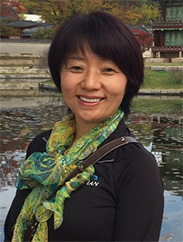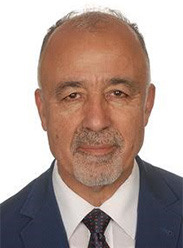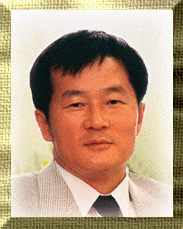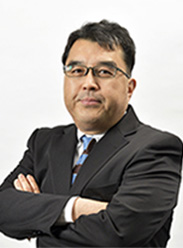Keynote Speakers
- Name
- Sharon Peng
- Title
- Artificial Intelligence and Its Applications in Consumer Electronics
- Organization
- IEEE Fellow / Vice President of Global Engineering / Lifestyle Audio USA / Harman – A Samsung Company
- Schedule
- Monday, May 27 (9:00-10:00)
- Name
- Mohamad Sawan
- Title
- Trends Shaping Opportunities for Neurodegenerative Diseases Treatment
- Organization
- School of Engineering, Westlake University, Hangzhou, China, and Polytechnique Montréal, Montreal, Canada
- Schedule
- Tuesday, May 28 (8:30-9:30)
- Name
- Chong-Min Kyung
- Title
- Forging and Steering Academic R&D Efforts into Successful Startups
- Organization
- Korea Advanced Institute of Science and Technology (KAIST), Korea
- Schedule
- Tuesday, May 28 (17:00-18:00)
- Name
- Yuichi Nakamura
- Title
- Social Value Creation Accelerated by Circuits and Systems Technologies
- Organization
- NEC Corporation, Japan
- Schedule
- Wednesday, May 29 (8:30-9:30)

Sharon Peng
- Title:
- Artificial Intelligence and Its Applications in Consumer Electronics
- Organization:
- IEEE Fellow / Vice President of Global Engineering / Lifestyle Audio USA / Harman – A Samsung Company
- Schedule:
- Monday, May 27 (9:00-10:00)
Technology advances and accessibility has led consumer electronics to new era. Consumer electronics industry has evolved from making fully passive electronics to intelligent and user experience driven smart devices and technologies in the last 15 years. During this evolution, Artificial Intelligence (AI) technology has achieved revolutionary step with the enabling semiconductor and network technology fast growth. AI technology becomes affordable to ordinary consumers and is playing an increasing important role in consumer electronics applications. AI applications in consumer electronics development is going through three phases: Isolated and limited smart functions on fixed hardware devices; Interoperable system of systems; fully connected and autonomous artificial intelligent system. In this talk, the latest AI technology application in consumer devices will be reviewed and studied. Then using audio technology application as an example, the smart audio applications will be introduced via hardware and software architecture evolution. We will further dive into the machine learning algorithms that improve sound quality, adapt to user experience, and personalize the individual’s needs. The talk will conclude with how the AI application fundamentally subversion the traditional hardware driven industry and change the user habits and expectations.
-
Biography
Dr. Sharon Peng has been working in the consumer electronics industry for the 25 years. Her career includes working at Philips Research Laboratories, Harman R&D center and consumer product division. Her served positions including senior research staff, principle DSP engineer, principal audio/video system architect, hardware manager, director of R&D center, director of product engineering, and now the vice president of Global Engineering of Harman Consumer Audio division. Her expertise and experience includes audio and video system architectures and algorithms, audio or video codec and feature enhancement algorithms, display processing, home/portable/hearable consumer products, and the virtual personal assistant consumer products using Machine Learning algorithms and artificial intelligence technology.
Dr. Peng received her M.S. and Ph.D in Electrical Engineering from University of Minnesota, USA. She is an IEEE Fellow. Dr. Peng has generated more than 26 U.S. patents. She is also a longtime volunteer in IEEE and has served as the President of IEEE Consumer Electronics Society from 2015 - 2018.

Mohamad Sawan
- Title:
- Trends Shaping Opportunities for Neurodegenerative Diseases Treatment
- Organization:
- School of Engineering, Westlake University, Hangzhou, China, and Polytechnique Montréal, Montreal, Canada
- Schedule:
- Tuesday, May 28 (8:30-9:30)
Characterized by processes dysfunctions of central nervous system, nowadays neurodegenerative diseases affect an increasing number of patients. Located at the level of neural cells or interactions between them, these diseases can be Parkinson, Alzheimer, Huntington, Epilepsy, Vision, etc. Some of these diseases still not fully understood, others are not efficiently treated. The first line of treatment is the use of dedicated drugs, some diseases are treated with surgery, however little patients are not drug resistant and the success rate of surgery, when applicable, remains very modest. Evolving biomedical circuits and systems fields in coordination with expertise’s from various pure and medical sciences are promising alternatives to study neural activities underlying cognitive functions and pathologies, and eventually to recover lost neural vital functions. This talk covers circuit and microsystem techniques dealing with multidimensional design challenges such as microsystem architectures, power management, wireless communication, reliable harvesting energy methods, tissue interfaces, etc. Signal and ion sensing and processing techniques will be discussed. Case studies of intracortical neurorecording and microstimulation to recover vision for the blinds, and epileptic seizure foci localization and subsequent detection and abortion, as well as deep-learning based prediction of seizures will be reported.
-
Biography
- Prof. Mohamad Sawan received the Ph.D. degree in Electrical Engineering from Universite de Sherbrooke, Sherbrooke, QC, Canada, in 1990. He is a Professor of Microelectronics and Biomedical Engineering, in leave of absence from Polytechnique Montréal, Canada. He joined Westlake University, Hangzhou, China, in 2019, where he is a Chair Professor founder and director of the Center for Biomedical and Research And INnovation (CenBRAIN). He was Chair Professor awarded the Canada Research Chair in Smart Medical Devices (2001-2015), was leading the Microsystems Strategic Alliance of Quebec - ReSMiQ (1999-2018). He founded and Chaired the IEEE-Solid State Circuits Society Montreal Chapter (1999-2018), and founded the Polystim Neurotech Laboratory in Polytechnique Montréal (1994-Present), including two major research infrastructures intended to build advanced Medical devices. Dr. Sawan was Deputy Editor-in Chief of the IEEE Transactions on Circuits and Systems-II: Express Briefs (2010-2013), Co-Founder, Associate Editor and Editor-in-Chief of the IEEE Transactions on Biomedical Circuits and Systems, Associate Editor of the IEEE Transactions on Biomedical Engineering, and the International Journal of Circuit Theory and Applications. He is founder of the International IEEE-NEWCAS Conference, and Co-Founder of the International IEEE-BioCAS, ICECS and LSC conferences. He hosted in Montreal, as General Chair, the 2016 IEEE International Symposium on Circuits and Systems (ISCAS), and will host as General Chair, the 2020 IEEE International Medicine, Biology and Engineering Conference (EMBC). He served as member of the Board of Governors (2014-2018), and he is Vice-President Publications (2019-Present) of the IEEE CAS Society. Dr. Sawan published more than 800 peer reviewed papers, two books, 10 book chapters, and 12 patents. He received several awards, among them the Queen Elizabeth II Golden Jubilee Medal, the Barbara Turnbull 2003 Award for spinal-cord research, the Bombardier and Jacques-Rousseau Awards for academic achievements, the Shanghai International Collaboration Award, and the medal of merit from the President of Lebanon for his outstanding contributions. Dr. Sawan is Fellow of the IEEE, Fellow of the Canadian Academy of Engineering, and Fellow of the Engineering Institutes of Canada. He is also “Officer” of the National Order of Quebec.

Chong-Min Kyung
- Title:
- Forging and Steering Academic R&D Efforts into Successful Startups
- Organization:
- Korea Advanced Institute of Science and Technology (KAIST), Korea
- Schedule:
- Tuesday, May 28 (17:00-18:00)
Closing the gap between different disciplines and different stages of engineering development is important in executing large-scale research project. Also, entrepreneurship is critical as a seed carrying over the technology accrued in one generation to the next one. Now, how can university professors successfully form and run high-impact research projects, i.e., stimulate young minds, produce good papers, and start and run good companies? How should one set up the research objective and evaluation measures, organize and stimulate research/support team, and secure and allocate the resources?
These are the questions we have tried to answer during the pursuit of a large-scale R&D project on the smart sensor systems development for the last 7+ years. During last three years we have launched over 30 research projects with most of them spun off as startups. We have learned from both successes and failures in various stages of the R&D and startup formation. Our R&DB (B for business) examples include low-energy structural health monitoring for large bridges and buildings, and single camera-based 3D scene capture for speed and accuracy.
Also we were faced with technical difficulty in accessing 3-D IC, vehicular, bio technology, either owing to business secrecy or different cultures. Often we were either too optimistic or unprepared in the aspect of understanding the market. For the failures we share in this talk the plausible reasons; for the successes we describe what happened.
-
Biography
- Chong-Min Kyung received the B.S. degree in Electronics Engineering from Seoul National University in 1975, the M.S. and Ph.D. degree in Electrical Engineering from KAIST in 1977 and 1981, respectively. From April 1981 to January 1983, he worked at Bell Telephone Laboratories, Murray Hill, New Jersey as a postdoc. He joined KAIST in February 1983 as Assistant Professor in the Department of Electrical Engineering, where he is now Professor. He founded IDEC (IC Design Education Center) in 1995 to support IC design education in Korean universities nationwide. He was a visiting professor at the Univ. Karsruhe, Germany, from in 1989, as an Alexander von Humboldt fellow, a visiting professor at the University of Tokyo in 1985, Chuo University in 2005, at the Technical Univ. of Munich during in 1994, at Waseda University during 2003–2006, at the University of Auckland, New Zealand during 2005–2006. His interested research area includes SoC (System-on-a-Chip) design and verification methodology, microprocessor and DSP architectures for low-power and various multi-media embedded applications, 3-D cameras and smart sensor systems. He has published over 300 papers in the international conferences and journals in the SoC design, EDA algorithm, computer architecture and smart sensor systems. He received the Most Excellent Design Award, and Special Feature Award in the University Design Contest in the ASP-DAC 1997 and 1998, respectively. He received Best Paper/Design Awards in numerous international conferences including ASP-DAC 1997 and 1998, DAC in 2000, ICSPAT in 1999, ICCD in 1999, and ISQED in 2014. He is a member of National Academy of Engineering Korea, and Korean Academy of Science and Technology, and IEEE fellow. In 2011 he founded and currently leads a number of core projects including 3-D camera systems, air and water pollution monitoring systems, open-platform event logging systems as Director the Center for Integrated Smart Sensors (CISS), a Global Frontier Project supported for 9 years by Korean Government.

Yuichi Nakamura
- Title:
- Social Value Creation Accelerated by Circuits and Systems Technologies
- Organization:
- NEC Corporation, Japan
- Schedule:
- Wednesday, May 29 (8:30-9:30)
Because of increasing urban population, various social problems would be occurred in various areas, for example, crimes, luck of resources, broken of infrastructure. In the cases, an integration of ICT (Information and Communication Technology) by using “Circuits and Systems technologies” is one of the good methods to solve such the problems. For example, we NEC obtain the NO.1 position in 3 biometrics applications, iris, face, and finger point recognition by using “Circuits and Systems technologies” like as signal processing, circuit design, parallel computing, neural network and etc. In this talk, the latest use cases to solve the various social problems are introduced. In addition, requests from real social problem to “Circuits and Systems technologies” is presented.
-
Biography
- Yuichi Nakamura received his B.E. degree in information engineering and M.E. degree in electrical engineering from the Tokyo Institute of Technology in 1986 and 1988, respectively. He received his PhD. from the Graduate School of Information, Production and Systems, Waseda University, in 2007. He joined NEC Corp. in 1988 and he is currently a vice president at R&D, NEC Corp. He is also a guest professor of National Institute of Informatics. He has more than 25 years of professional experience in digital and analog circuit design, electronic design automation, and signal processing.

